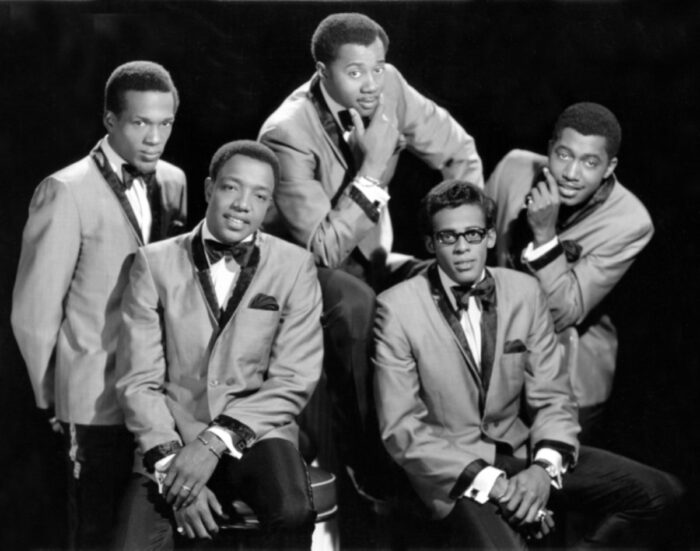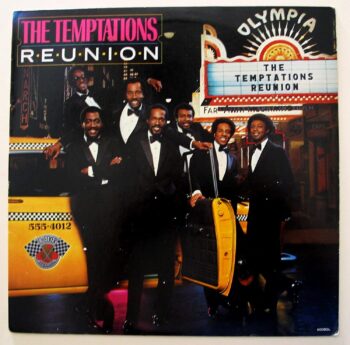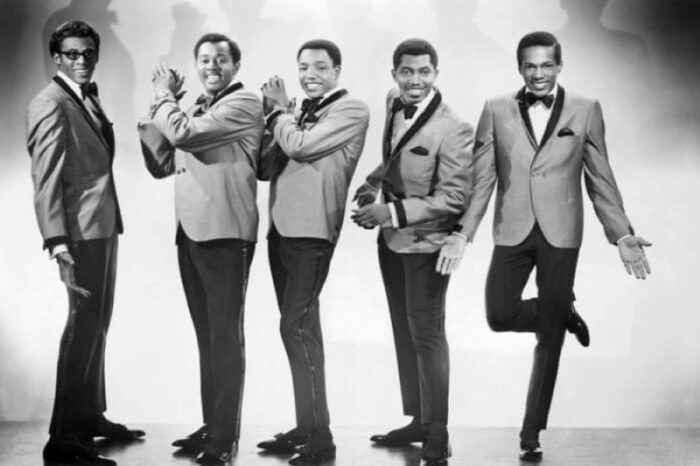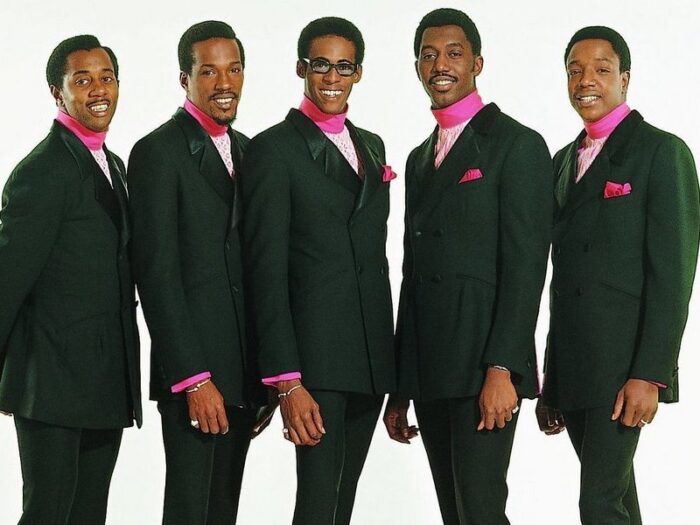The Temptations – Temptations 60: Album Review
The Temptations are the foundation group from which Soul music was defined. Of course, there are others, but for laying down the blueprint and then to be at the forefront of innovation over a long haul, they are the Emperors of Soul.
If James Brown led from the front and was always ahead of Time, these guys were as carefully manufactured as Elvis inside the Sun studio with Sam Phillips.
We are going to start at the end of the album with Come On, which is the once upon a time where the legend begins.
Otis Williams (Temptation from 1960 to today) had co-written this song, and his group the Distants were getting enthusiastic local attention with it. The original single is a stone classic of R’n’B possessing Gospel, speaking in tongues and inspiring the likes of Otis Redding, Wilson Pickett and the Mersey Sound to come. Fast-stepping irresistible rhythm riffs from the backing band Popcorn and the Mohawks which included James Jamerson on stand-up bass and Norman Whitfield on tambourine.
 As great as that was, it is the singers that exploded this with an inspired performance of blended vocal lightning. Richard Street (1971 to 1993) sang lead and Melvin Franklin (1960 to 1994) laid down an incredible bass counterpoint.
As great as that was, it is the singers that exploded this with an inspired performance of blended vocal lightning. Richard Street (1971 to 1993) sang lead and Melvin Franklin (1960 to 1994) laid down an incredible bass counterpoint.
The only place I have ever found it is on the Emperors of Soul five-CD boxset released by Motown records in 1994, where it has pride of place at the beginning.
Berry Gordy was at a performance one night, along with good friend and Motown collaborator from the start, William Smokey Robinson.
Otis relates the story in an extended monologue which precedes this version of the song. The music is polished with more elements added, but the voices recreate the excitement of the original.
Along with the founding member are current Temptations, Ron Tyson (1983 to now), Terry Weeks (1997 -), Willie Green (2015 -) and Tony Grant (2021 -)
Back in 1960, Otis and his then band the Elgins gathered at the Motown headquarters, Hitsville USA, with Gordy furiously working out how to come up with the super-group he knew was there. Another group also arrived, the Primes featuring a sublime falsetto singer Eddie Kendricks (1960 to 1971). He grabbed his invite.
All the songwriter-producers had a go at trying to come up with the hit song that would begin the journey. Even with Berry Gordy and Holland-Dozier-Holland writing quality material, it wouldn’t fire.
Smokey Robinson was the main pillar of success at that time with his band the Miracles. In desperation, he was given the hard work to make it happen. Then the last two ingredients came together to form the explosion.
David Ruffin (1964 to 1968) pushed his way into the band by gate-crashing their live performances. One of the greatest voices ever (My Girl), and he has stamped his mark on all Soul singers to follow.
Robinson came up with The Way You Do the Things You Do and they were off. Kendricks sang lead and Ruffin sounds like he is spontaneously combusting for a few brief seconds on the chorus.
The classic line-up was in place. Otis Williams, Eddie Kendricks, David Ruffin, Melvin Franklin and Paul Williams (1960 to 1971).
From here Robinson and the Temptations crafted the most sublime soul music ever put down. The songs were carefully arranged for all the voices to both lead and blend. The Temptations Sing Smokey album from 1965 is the pinnacle of their first golden phase.
Robinson has worked that magic one more time on this album with his contribution Is It Gonna Be Yes or No. This is the first time he has sung with them on record. Past and present end up as timeless. Silky smooth voices carefully arranged. A personified bass in the best tradition of James Jamerson. There is even a short melodic guitar phrase towards the end as a nod to Marvin Tarplin.
The next songwriter and producer obsessed with the band and bursting to break out was Norman Whitfield. He looked for a harder R’n’B sound and elevated Ruffin to predominant lead voice.
Whitfield was embracing James Brown Funk and Sly Stone. The Temptations Psychedelic Soul sound was birthed around 1968 when Ruffin was fired and Dennis Edwards (1968 to 1989) from the Contours got drafted. Close in style but with a different grit inside the Church voice. This also heralded the new direction of Soul music around the era of Blaxploitation in movies, television and books. Kendrick’s falsetto was a cue for Curtis Mayfield to expand that idea out to the classic Superfly album.
Time for the People starts with protestors chanting. The singers chime in with the title slogan. The music fires up with polyrhythmic percussion, including what sounds like tablas’. This time around the lyrics, co-written by Ron Tyson, are sharp and topical. Some things don’t change. Drugs and alcohol are killing the neighbourhood. Dennis Coffey style guitar riffs wail towards the end of the song.
How Do You Spell Love is similar with the bass rumbling deep subsonic tones. The Funk is bubbling in the cauldron and the singers give it a smooth polish with carefully layered vocal interplay.
The Temptations, like the Rolling Stones, kept abreast of the evolving Black musical styles up to the Disco era.
On opening track Let It Reign, it is Rap artist Kyle Hunter known as K. Sparks who has written the song and lays out a beat-driven polemic. A Jazz trumpet begins, the bass guitar leads with some heavy Funk and the Temptations weave into the mix with perfect vocals. We need peace/ We need change/ Save my soul. The first time the group has addressed Rap, to my ears.
After Whitfield left in the mid-Seventies, the Temptations settled back into comfortable smooth Soul to a loyal fan base. There were always highlights to pick out but they were few and far between. They settled into keeping the shop open.
 A Reunion Album in 1982 was a reasonable attempt with most of the original guys pitching in, singers and songwriters. The best was a Rick James song, Standing on the Top.
A Reunion Album in 1982 was a reasonable attempt with most of the original guys pitching in, singers and songwriters. The best was a Rick James song, Standing on the Top.
This album is better. A lot of the songs have been written by Otis Williams, and he has an ear for what makes a classic smooth Soul song.
When We Were Kings is a superb song outlining their history of five-part harmony. It is triumphant in the same sense as the movie title it refers to. The documentary of Muhammed Ali fighting George Foreman in the Rumble in the Jungle. One of the greatest boxing contests ever, and prefaced by a stellar concert headlined by James Brown.
My Whole World Stopped. A stand-out lead vocal performance and possibly an homage to the late David Ruffin. The phrasing is similar, down to the little Gospel yodels. The sudden leap to falsetto. Time used to fly/ Till you walked out that door.
Teardrop guitar riffs and the song has the heartbreak of those Roger Penzabene masterpieces. I Wish It Would Rain and I Could Never Love Another. His own life was the source material and he committed suicide aged twenty-three.
You Don’t Know Your Woman (Like I Do) swings like a classic Northern Soul floor–filler.
Calling Out Your Name is the essential slow song, when you want to hold someone close. The trumpets act like the piper and the singers fill the space with perfectly blended voices. Rod Stewart will pay attention.
I Want It Right Now. Jamaican kettle drums to start. An all-encompassing bass guitar playing multiple rhythm lines. A Rock Steady to Reggae tune with a similar dance step to Dave and Ansell Collin’s Burning Love.
Motown has deep roots into Jamaican music and you could start with Don’t Look Back. Written by Smoky Robinson and probably Paul Williams’ finest lead vocal. Trace that all the way up to Bob Marley and No Woman, No Cry.
A superb testament from one of the greatest Soul institutions. Even the fillers. Otis Williams sounds humble and thankful at the end of the album, which is the beginning.
Well, in the morning/ In the evening/ In the night time/ It’s the right time/ It’s the best time/ Ever since that wonderful day/ I wanna make love to you/ Come on! Come On!
Rev Orange Peel
Follow The Temptations: WEBSITE YOUTUBE SPOTIFY FACEBOOK


